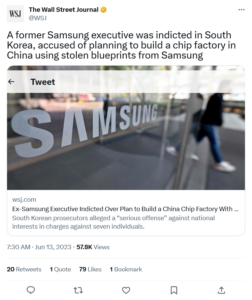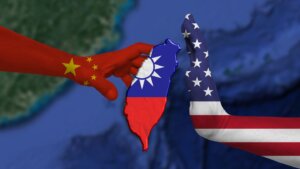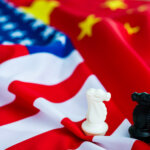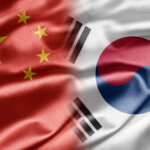South Korea and Taiwan allowed to continue Chinese operations

|
Getting your Trinity Audio player ready...
|
• Taiwanese and South Korean chipmakers to continue Chinese trade.
• US and China relations strained over semiconductor market.
• Secretary of State to visit Beijing soon.
The US-China semiconductor drama continues! In a move that analysts say will weaken export control measures aimed at Beijing, the US will allow South Korean and Taiwanese chip makers to continue operations in China.
The US undersecretary of commerce for industry and security, Alan Estevez, announced the decision at an industry gathering last week.
According to the Wall Street Journal, exemptions that were initially granted for one year from last October will be extended. They apply to South Korean and Taiwanese companies, including Samsung Electronics and Taiwan Semiconductor Manufacturing (TSMC), who have invested billions in building plants in China.

Relations between the US and China over semiconductor technology are strained.
The move won’t help slow China’s technological progress and is reflective of the challenges the US is facing in isolating China from high-end tech goods. Semiconductor manufacturers from the US and abroad have resisted the efforts to restrict access to Chinese markets, and European and Asian governments have pushed back against the Biden administration’s plans.
The South Korean dilemma.
South Korea, whose largest export market is China, has been especially vocal in its opposition. On June 8, President Yoon Suk Yeol pledged support for the South Korean chip market, describing competition in the industry as an “all-out war” amid heightened tensions.
South-Korean chipmakers Samsung Electronics and SK Hynix are dependent on US technology and equipment, but 40% of South Korea’s exports go to China. South Korea’s allegiance to either side would be huge, but the country is doing its best to stay impartial, reaping the benefits that both sides offer.
Taiwan is also a contentious area. Although the US claims to support the One China policy and doesn’t want to stop China’s development, its claim that Taiwan has always been a part of China is a problem.
In recent weeks the US military has accused Chinese forces of “unsafe” and “unnecessarily aggressive” maneuvers in the Taiwan Strait and the South China Sea, two areas where the US is especially concerned about China’s increasing presence.

Taiwan is crucial to the semiconductor plans of both the US and China.
An all-out Chinese invasion of Taiwan would cause the chip industry to implode. Taiwan alone manufactures more than 60% of the world’s semiconductors, and 90% of the most advanced ones. Were manufacture to halt in Taiwan, semiconductor supplies globally would drop; TSMC could build manufacturing plants elsewhere, but the process would take years.
In Washington, there are advocates for a stronger stance on China, especially among Republican lawmakers. However, US officials have recently said they don’t want to decouple from China. Instead, they’re aiming to limit restrictions to highly strategic technologies, acknowledging that a full separation from China’s economy would be disastrous for both countries.
Critical compromise.
As such, compromise is critical. The US-China semiconductor battle has global implications, not to mention the havoc it could wreak on the chip industry. The tangible steps the countries are taking to decouple their economies means claims from China and the US that they want an open dialogue ring hollow.
Still, there is some hope, as the warming of relations Joe Biden predicted materializes: on June 18, Antony Blinken will visit Beijing.

Secretary of State Blinken, soon to visit Beijing. Source: Brendan SMIALOWSKI / AFP
What we can expect of that trip is the stuff of speculation, but at least a physical visit will deliver optics that counter the decoupling narrative – and possibly cool down anti-Chinese sentiment in Washington.











